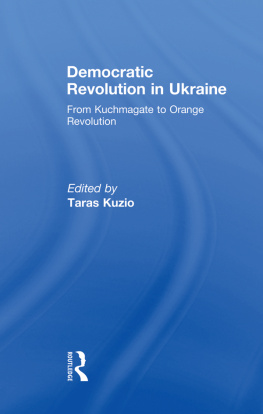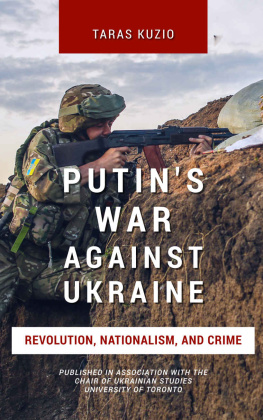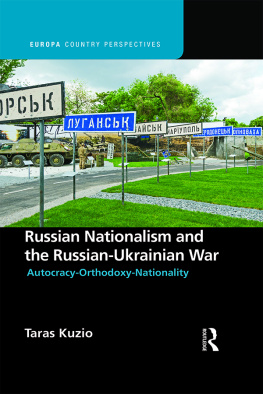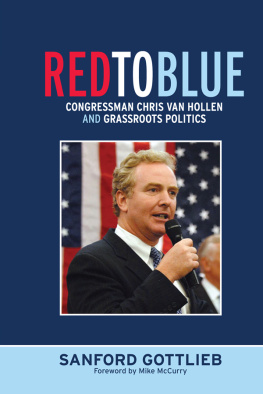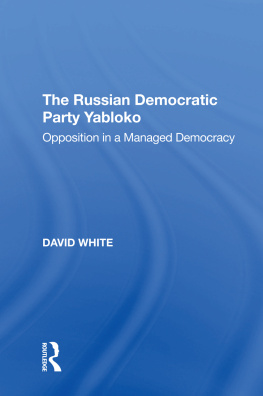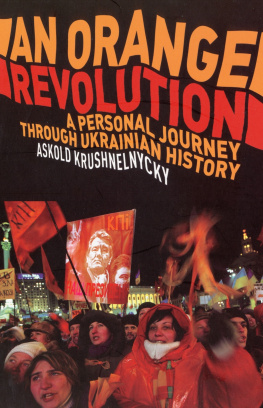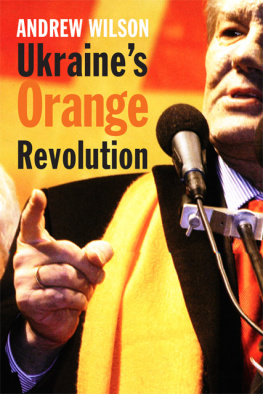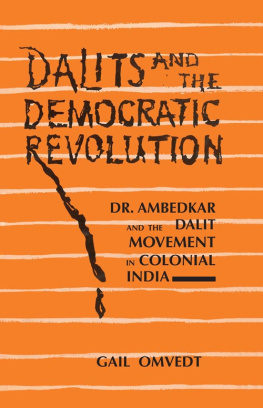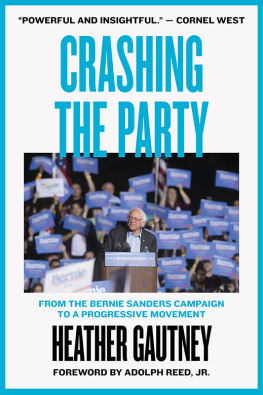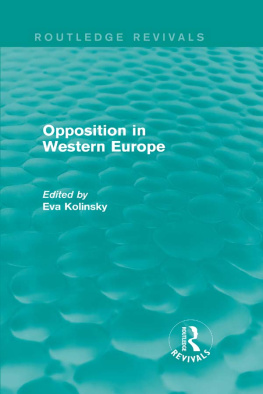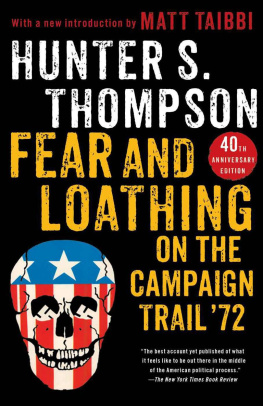Democratic Revolution in Ukraine
In 2000 a beheaded journalist was found in a remote forest near Kyiv. The corpse led to a scandal when it was revealed that it was that of a journalist critical of the authorities. The President was heard on tapes, made covertly in his office, ordering violence to be undertaken against the journalist. The scandal led to the creation of a wide protest movement that culminated in the victory of democratic opposition parties in 2002. The democratic opposition, led by its presidential candidate Viktor Yushchenko, fought a bitter and fraudulent election campaign in 2004 during which he was poisoned. Widespread election fraud led to Europes largest protest movement since the Cold War which became known as the Orange Revolution, known after the campaign colour of the democratic opposition.
This book is the first to provide a collection of studies surveying different aspects of the rise of the Ukraines democratic opposition from marginalization, to protest against presidential abuse of office and culminating in the Orange Revolution. It integrates the Kuchmagate crisis of 20002001 with that of the Orange Revolution four years later providing a rich, detailed and original study of the origins of the Orange Revolution.
This book was published as a special issue of the Journal of Communist Studies and Transition Politics.
Taras Kuzio currently teaches at the Institute of European, Russian and Eurasian Studies at Carleton University, Ottawa. He was a Visiting Professor at George Washington University, Adjunct Professor at the Department of Political Science, University of Toronto, and a Senior Research Fellow at the Centre for Russian & East European Studies, University of Birmingham. In these posts, he has taught on contemporary Ukrainian politics, nationalism, democratic revolutions, European Union politics and Trans-Atlantic Security. He was also Head of Mission at the NATO Information Office in Kyiv.
Democratic Revolution in Ukraine
From Kuchmagate to Orange Revolution
Edited by Taras Kuzio
First published 2009 by Routledge
2 Park Square, Milton Park, Abingdon, Oxon, OX14 4RN
Simultaneously published in the USA and Canada
by Routledge
711 Third Avenue, New York, NY 10017
Routledge is an imprint of the Taylor & Francis Group, an informa business
Transferred to Digital Printing 2009
2009 Edited by Taras Kuzio
First issued in paperback 2013
All rights reserved. No part of this book may be reprinted or reproduced or utilised in any form or by any electronic, mechanical, or other means, now known or hereafter invented, including photocopying and recording, or in any information storage or retrieval system, without permission in writing from the publishers.
British Library Cataloguing in Publication Data
A catalogue record for this book is available from the British Library
ISBN 13: 978-0-415-44141-4 (hbk)
ISBN 13: 978-0-415-84698-1 (pbk)
Paul DAnieri is Dean of the College of Liberal Arts and Sciences and Professor of Political Science at the University of Florida. He is the author of Economic Interdependence in Ukrainian-Russian Relations (1999) and, with Robert Kravchuk and Taras Kuzio, Politics and Society in Ukraine (1999). His latest book is Understanding Ukrainian Politics: Power, Politics, and Institutional Design (2007).
Olga Filippova is Associate Professor of sociology at V.N. Karazin Kharkiv National University. She has published articles in Ukrainian, Russian and English on a variety of topics pertaining to politics of identity and Ukrainian national identity, and is currently researching cyber-ethnography of Ukrainian society.
Anna Fournier is Assistant Professor of Anthropology at the University of Manitoba. Her research on Ukraine has dealt with citizenship education, identity politics, and EU integration. Her articles have appeared in Europe-Asia Studies and the Journal of Communist Studies & Transition Politics.
Erik Herron is Associate Professor of Political Science at the University of Kansas. He has published articles and book chapters about elections in Eastern Europe and Eurasia. He is author, with Federico Ferrara and Misa Nishikawa, of Mixed Electoral Systems: Contamination and Its Consequences (2005). His latest book is Elections and Democracy After Communism? (2009).
Alexandra Hrycak is Associate Professor and Chair of the Department of Sociology at Reed College, and President of the American Association for Ukrainian Studies. Her research on the development of civic associations and identity among women in Ukraine and post-communist states have appeared in American Journal of Sociology, Womens Studies Quarterly, Journal of Communist Studies & Transition Politics, East European Politics and Societies, Problems of Post-Communism, and Harvard Ukrainian Studies.
Bohdan Klid is a historian and Assistant Director and Research Scholar at the Canadian Institute of Ukrainian Studies, University of Alberta. He has published articles in English and Ukrainian, mainly on Volodymyr Antonovych and nineteenth to early twentieth century Ukrainian historiography.
Serhiy Kudelia is Adjunct Professor of Political Science at Kyiv-Mohyla Academy (Ukraine). His publications include The Strategy of Campaigning: Lessons from Ronald Reagan and Boris Yeltsin (2007) co-authored with Kiron Skinner, Bruce Bueno de Mesquita and Condoleezza Rice.
Taras Kuzio is an Adjunct Professor in the Department of Political Science, Carleton University, Ottawa. He is the author and editor of 14 books and 5 think tank monographs and has guest edited 6 special issues of academic journals. He has published 25 book chapters and 60 political science articles on post-communist, Ukrainian and European politics. His latest book is Theoretical and Comparative Perspectives on Nationalism (2007) and he is writing a Contemporary History of Ukraine.
Taras Kuzio
The eight articles in this book cover a broad range of hitherto unexplored themes on the popular protests against election fraud in Ukraines 2004 presidential elections that came to be known as the Orange Revolution. The articles analyse Ukraines 2004 elections and Orange Revolution within the historical context of the struggle for power between the pro-democratic opposition and a coalition of centrist parties linked to big business and oligarch interests allied with President Leonid Kuchma. Kuchmas second term in office was plagued by scandal in winter 2000, which came to be known as Kuchmagate or Tapegate after tapes illicitly made in his office by a security guard implicated the president in the disappearance of a journalist who was subsequently murdered. The Kuchmagate crisis unleashed mass protests and pushed Viktor Yushchenko into opposition, both of which became the prelude for the mass protests four years later when Kuchma with Russias massive intervention sought to engineer a victory by his chosen successor, Viktor Yanukovych.
The eight articles deal with a range of subjects that covers Ukraines important transition from the Kuchma era to that of Yushchenko. The book is therefore a broader study that places the Orange Revolution in historical context and aims to locate our understanding of it within a twofold broader context.
First, the Orange Revolution took place not only because of election fraud during the presidential elections, but primarily because of a deep-seated political and social crisis in Ukraine that had been building up during Kuchmas decade in office. The first term of which had seen massive socio-economic collapse and impoverishment of Ukraines population and the enrichment of a small handful of elites who became collectively known as oligarchs.

